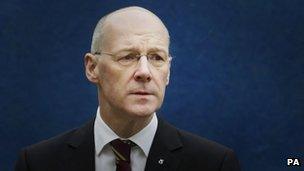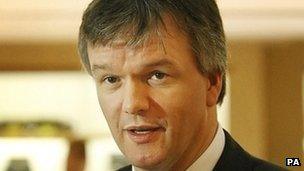Budget 2013: Governments row over details of spending
- Published

John Swinney said Scotland had been put in a "straitjacket" by UK ministers
Scottish Finance Secretary John Swinney has accused the UK government of "deceit" over claims the Budget would boost the economy north of the border.
Westminster ministers said the Scottish budget would be boosted by an extra £176m over the next two years.
But Mr Swinney said Chancellor George Osborne had replaced real money with loans which would have to be paid back.
The UK government said Scots would also benefit from tax changes and cancellation of the fuel duty increase.
Scottish Secretary Michael Moore said the Budget would support families and businesses, and would include a £279m increase in capital investment north of the border, with a cut in day-to-day spending of £103m.
Mr Swinney said the cut amounted to £107m and accused Coalition ministers of putting Scotland in a "straitjacket" by failing to deliver measures to aid short-term economic growth.
The UK government said the Budget would result in:
The Scottish government getting an overall additional spending power of £176m over the next two years under Barnett funding consequentials.
This includes a £55m increase in 2013-14 and a £121m increase in 2014-15, coming from a £279m increase in capital funding, with a reduction in the resource budget by £103m.
A cut of 0.2% to the Scottish budget, "about a fifth experienced by most UK departments".
An extra £1.7bn for the Scottish government on top of what was originally announced in the 2010 Spending Review.
Mr Moore said: "Today's budget shows the Coalition government is building a stronger economy and fairer society to equip Scotland and the UK to succeed in the global race.
"We face many economic challenges but this government has shown we can deliver, with one million private sector jobs and increasing personal tax allowances to £10,000 - taking 224,000 people in Scotland out of tax altogether."
The Scottish secretary went on: "We are supporting families, individuals, both small and large businesses, and investing in the future with this Budget.
"It is good news for Scotland and will help us build on the positive changes we are making to rebalance our economy."

Scottish Secretary Michael Moore says measures in the Budget will help businesses and families
But Mr Swinney said the UK government had put the economy in a "growth crisis" and urged "caution" over its Scottish figures.
He told BBC Scotland: "The chancellor has taken away £107m of hard cash that we could spend on particular projects of our decision-making and he's replaced it with loan facilities that will have to be paid back at a later date.
"That does not translate into a cash boost for capital investment in our economy and that's the central deceit at the heart of this budget - an instrument by the chancellor to make his measures look better than they are."
The Scots finance secretary added: "What we've essentially got is a chancellor putting a straitjacket on the public finances of Scotland, restricting our room for manoeuvre and restricting the hard cash - real money - we can spend."
The UK government confirmed most of the capital money available to Scotland would be in the form of loans and shared equity, primarily for housing.
But it argued this amounted to significant new resources - and an opportunity to grow the economy.
Highlighting other measures, the UK government said the Budget would:
Raise the income tax threshold to £10,000 from next April, taking a quarter of a million Scots out of income tax altogether and cut it by £700 for more than two million Scots.
Cancel the fuel duty rise, due to come into effect in September, benefitting owners of 2.7 million vehicles in Scotland, saving a typical motorist £25, van driver £50 and haulier £750 per year.
Pay 20% of the childcare costs for over 300,000 children under 12 in Scotland.
In a statement released later, the Scotland Office said: "This Budget provides extra spending power for the Scottish government of £176m through Barnett consequentials.
"In line with the approach to the house building schemes which give rise to these consequentials in England, most of this extra money comes in the form of financial transactions. The Scottish government has flexibility and discretion over this additional funding as long as they use it as a financial transaction and already plans to use some of its budget for this purpose.
"It is for the Scottish government to determine whether it wishes to use this additional spending power to support construction projects such as housing, as the UK government is doing, or to try and create a row out of it."
North Sea
Meanwhile, the UK government said new figures published by the independent Office for Budget Responsibility, external (OBR) forecast total North Sea oil and gas revenue at £33.9bn between 2012-13 and 2017-18.
Ministers at Westminster said this was a downward revision of £0.9bn since the spending statement in the autumn and "considerably less" than those published by the Scottish government last week, external.
The Scottish government bulletin highlighted four potential scenarios that it says, taking account of recent trends in investment and prices, could result in the industry generating between £41bn and £57bn in tax revenue between 2012-13 and 2017-18.
Mr Moore said there was a gulf between those independent OBR figures and the "hugely optimistic" numbers published by the Scottish government.
But Mr Swinney said he was confident in his government's figures.